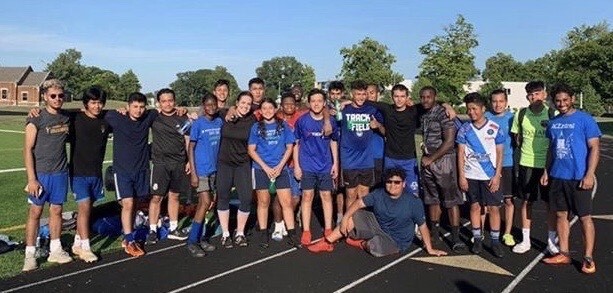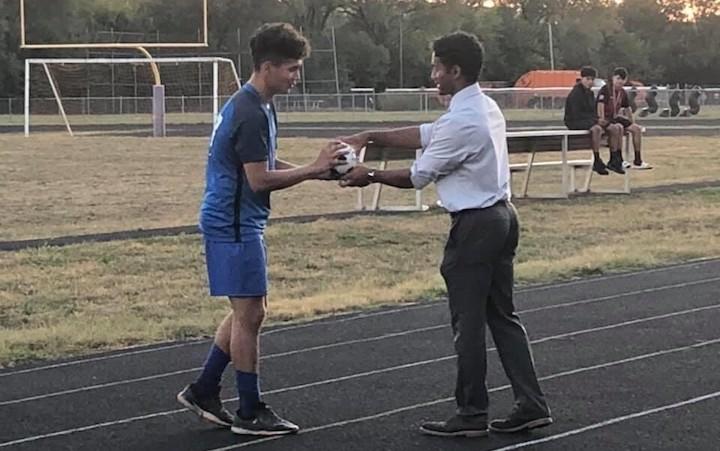As a high school soccer and middle school volleyball coach, I've had to talk about leadership to several students, so I've spent some time pondering this question:
What makes a good leader?
 It's hard to break down the complex and variable phenomenon of good leadership into pithy aspects, but one important quality of a leader is the ability to break down a complex problem into smaller, manageable tasks.
It's hard to break down the complex and variable phenomenon of good leadership into pithy aspects, but one important quality of a leader is the ability to break down a complex problem into smaller, manageable tasks.
My ACE experience has allowed me to both notice and improve aspects of leadership I hadn't considered before, some of which I tried to pass along to my student athletes.
Good leaders break down complex problems into achievable parts.
How do I teach students with little or no physics knowledge to succeed on a Free Response Question on the AP Exam?
How do we break past the other team's speedy defense in the second half?
Teaching and coaching give so much practice at breaking down complex problems. In ACE I gained some useful techniques to break down complex problems such as checklists and Model, Coach, Fade. I was fairly bad at breaking down complex problems for others before ACE, but now I do it relatively well.
Good leaders motivate others.
My whole life I have tended to be a very easygoing, go-with-the-flow, improvisational person. Before teaching, I hadn't realized the value of external motivation, and I didn't appreciate the tough, disagreeable teacher.
I think Machiavelli said it well: "It is better to be feared than loved, if you cannot be both." Possibly the most consequential personal change from my ACE experience is the increased capacity to be more intense and more ordered. I have received HUGE dividends from implementing this during my second year.
I am undeniably more strict than I was my first year, but I am definitely more liked by students this year. How can this be? I think the greatest way teachers love their students and build relationships is through caring about students' learning; this is more profound than any outside-the-classroom connections a teacher makes.
As a more intense second-year teacher, my students have noticed that I care deeply about their learning and they appreciate that. Tough, loving teachers can be very motivating leaders!

Good leaders hold others, and themselves, accountable.
Several kids I've coached have received in-game feedback from other players or myself very negatively. I've had to reframe for them that the purpose of getting called out is not to make you feel bad — it's a form of caring about you and the team. When all players hold each other accountable, then performance in practice and games improves. When you create systems of accountability and follow through consistently with consequences, you get better results.
The concept of accountability and having skin in the game is applicable far beyond sports and education — right now it is in the national conversation in the form of police accountability for brutality. I try to model accountability as best as I can for my students and athletes. Every good leader has effective systems of accountability.
 Good leaders communicate effectively.
Good leaders communicate effectively.
You can think like a great leader, but if no one on the field, court, or classroom can understand and be persuaded by you, then you are not a good leader!
I have a generally soft voice, but I've noticed I speak louder than I did two years ago. I use fewer filler words. I speak with better cadence — I used to rush and jumble my words. I've noticed I've developed ways to ensure I have quiet and attention before I speak. In general, I'm more articulate than I was two years ago.
Now I'm better at providing a quick and precise argument for why a student should do what I'm asking them to do. It's more difficult for a student to be defiant if my arguments are sound and persuasive. For example, "We don't talk across my classroom because it distracts from you and your classmates' learning, and I care too much about your learning to let you do that," is better than, "Stop that!"
Good leaders tend to have mantras that they repeat. I can still hear my middle school soccer coach saying, "The ball is faster than you," ten years ago to encourage us to pass instead of dribbling. ACE's Mark Johnson even had a mantra about why mantras are effective: "Repetition is the key to learning." Before ACE I perceived mantras to be cheesy, but now I often find myself using them.
Good leaders are charismatic (when they need to be).
I feel that I'm more charismatic as a leader than I was before ACE. Charismatic leaders are always intentional about building relationships and community, and this becomes easier as you get practice growing a class culture. I feel that teaching makes you more socially adept as you navigate the complex social and emotional states within a classroom. Two years of developing a teaching craft with good support will inevitably grow your confidence as a leader.
Good leaders work well with people of various demographics and backgrounds.
I've seen significantly more diversity of thought, background, and experiences in my classroom than I saw in my high school or college. I feel like my whole life I've been in a bubble of people who were generally very intelligent and affluent, and I am happy that bubble has popped. I feel that working with the diverse group in my classroom has better prepared me to work with and lead other groups of people.
In my two years of ACE I've seen dozens of instances of leadership: good and bad, in the classroom and on the soccer field, in my students and in myself.
One of the many joys of my ACE experience has been growing as a leader — an experience that I will be able to take as I transition from teaching science to researching science when I begin pursuing a PhD in chemical engineering in the fall.
Learn more about teaching and leading with ACE at ace.nd.edu/teach
 Alliance for Catholic Education
Alliance for Catholic Education

 Good leaders communicate effectively.
Good leaders communicate effectively.